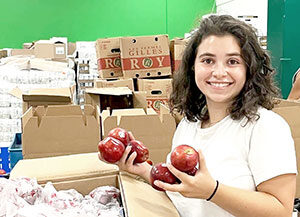
Nonprofit food rescue organization Food For Free is helping to feed the food insecure.
By Ryan DiLello
Every Tuesday and Thursday, my office provides a catered lunch. As I wrap up morning assignments, I watch the caterers march disposable tin trays of food up the stairs to our cafeteria where they warm it up for an hour over tiny portable burners.
One day, I was caught up in a conversation with a colleague that went beyond the lunch hour. In my periphery, I noticed the caterers wrapping up the food and placing it back on their transportation carts. Where did the leftover food go? I thought, noting that we never had leftovers in the cafeteria fridges.
Last week, I learned my company partners with a nonprofit food rescue organization. There are a number of these organizations around the greater Boston area, but Food for Free is one of the oldest. Founded in 1981, Food for Free coordinates with local retail, caterers, grocers, and food banks to rescue and transport food to food-insecure Massachusetts residents. Today, the organization serves more than 40,000 residents and rescues more than eight million pounds of nutritious fresh and prepared foods every year.
The need for food security is critical today, especially amidst the lingering effects of the COVID-19 pandemic. As of this year, one in 10 Massachusetts households struggle with food security. Inflation is having a two-fold impact on the food insecurity issue, increasing the barrier to nutritious foods for hunger relief organizations and residents alike. Food For Free’s mission is to provide safely-sourced, diverse and nutritious foods to Massachusetts residents in need.
Food For Free runs multiple food rescue programs, but the Heat-N-Eats program serves the Bunker Hill Community College (BHCC), only minutes outside of Somerville. I spoke to Food For Free’s Sam McDermott, Program Manager of Heat-N-Eats, as well as Molly Hansen, Senior Special Programs Coordinator at BHCC.
The Heat-N-Eats program has been a significant asset to the BHCC community, and is likely to grow, according to Hansen. The program recovers food from over 20 commercial food service operators on a biweekly basis, making the food into new frozen meals, and delivering it to BHCC students on a daily basis. This year, Heat-N-Eats rescued over 13,000 pounds of food and delivered 550 meals per week. McDermott says he plans to rescue closer to 40,000 pounds of food next year. Hansen noted that her team is working on grants to expand the frozen food program.
McDermott and Hansen share extensive backgrounds in food rescue and distribution. McDermott began working as a Program Manager for Food For Free after the pandemic revealed the fragility of the U.S. food system. A food science major in undergraduate school, and a five-year employee at Kraft Heinz, Food for Free offered McDermott a way to strengthen the food system on a local level – through the education system.
With 10 years of experience in higher education, Hansen joined BHCC in January of 2019. Hansen’s thesis focused on systems of support for addressing students’ basic needs. “I’ve always been passionate about the link between student need and success,” she said.
McDermott sounded a similar note. “If everyone were given access to the same education opportunities there would be a more just society. But there are basic needs that need to be met for students to perform,” he said.
Food insecurity is an especially pressing issue within the public education realm. In 2021, 37 percent of public university students in Massachusetts reported facing food insecurity – that number is likely only higher today.
“In partnering with community college pantries, our frozen meals are able to remove the stress of food prices and time associated with meal prep for food insecure students who already may be balancing school with other life priorities, such as jobs and family,” McDermott said.
Those interested in supporting Food for Free are encouraged to visit the organization’s website where they can sign up to volunteer and/or make a donation.















Reader Comments